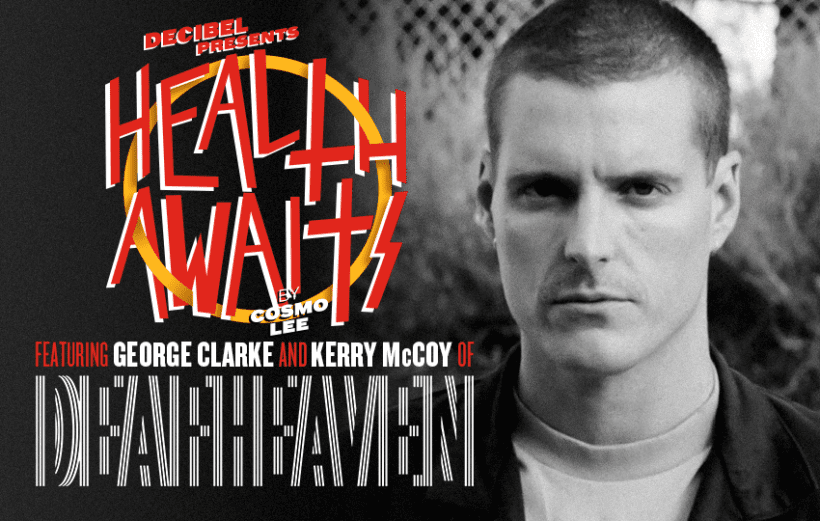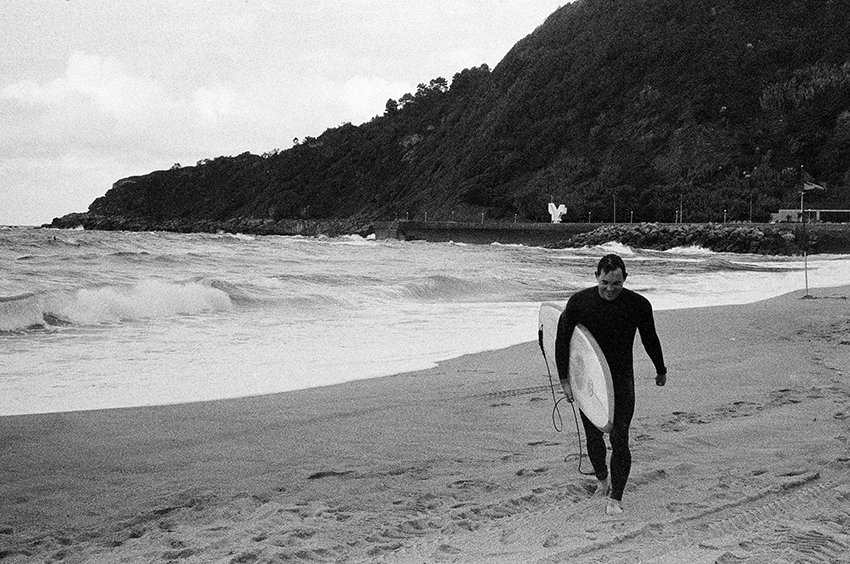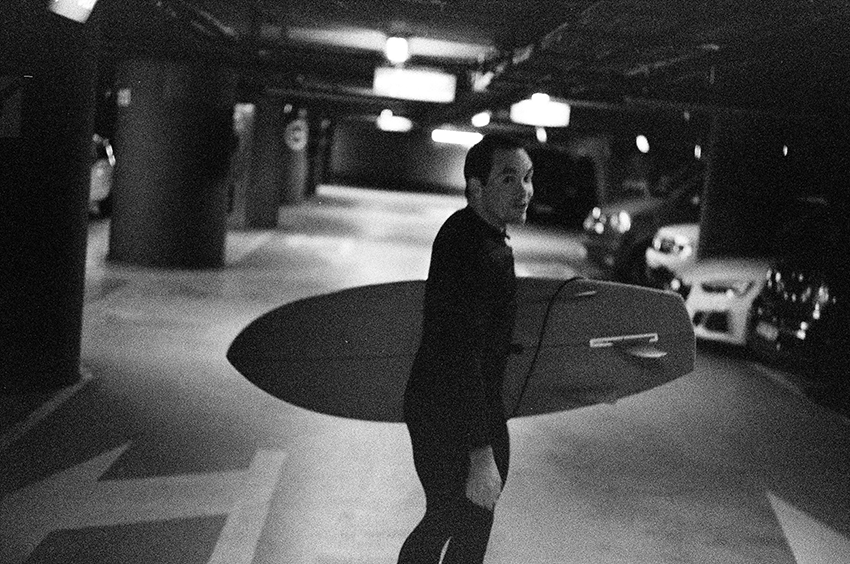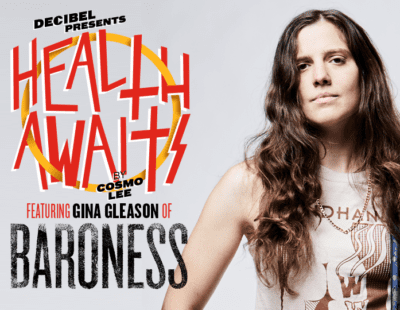
Deafheaven have come a long way from “Windows,” off 2013’s Sunbather, which contains audio of guitarist Kerry McCoy scoring drugs with the last of his cash. It’s incredibly harrowing. It’s perhaps just as incredible that Deafheaven as a band left years of drug and alcohol abuse behind. Now they’re sober, healthy, and making artistic strides with their latest album, Infinite Granite.
I talked to McCoy and vocalist George Clarke as they prepared to tour again after two years of COVID-19 pandemic. They presented a textbook lesson in how one is the company one keeps. (Their friends include previous Health Awaits interviewees Nate Garrett of Spirit Adrift and Gina Gleason of Baroness.) They also offered insight into staying balanced through life’s ups and downs – by staying busy, establishing routines, and keeping fit.
How have you held up during the pandemic?
Clarke: Pretty solidly. It’s just a matter of staying busy, staying active. As long as there’s some kind of forward momentum, things are generally OK.
McCoy: I think we were very lucky to live in California. There were a lot of artist grants that happened. MusiCares came through for us a couple times. Unemployment was both a blessing and a curse for the amount of hours you had to spend on the phone with them. But overall, I think we were really lucky. We’re at a position where we didn’t have to go into McDonald’s eight hours a day five days a week when 20,000 people a day were dying in the state.
Did you pick up any new practices or habits during this pandemic?
Clarke: If anything, it’s just a lesson in patience overall and readjusting expectations and just adapting to the situation. Fitness was pretty important. I have a pull-up bar above my door, and I got very into pull-ups as a means to conquer boredom.
McCoy: My plan was essentially to go surf every day if it was possible and then come home and run around this little reservoir. I spent the majority of those early months learning how to do stuff on Ableton. All the way up to summer 2020, it was mostly like wake up, surf, come home, run, shower, and then sit on the computer all day. The only thing habit-wise that I really tried to do was just staying in the moment and not trying to worry too much about the future.
Do you think that being tour veterans, you guys were already prepared in a way for pandemic? You’ve gone through peaks and valleys in a way that most people don’t.
Clarke: I do think that we tend to keep a more even keel because through touring and just living, we’ve experienced extremes and indulged in extremes, and I do think that perhaps in a way we’ve gathered these strengths over time, an ability to deal with things in a more patient manner. But on the other hand, being a tour veteran really showed how reliant we are on it – not just financially, but also spiritually. It’s a thing that we do, traveling and meeting people, and I find that the majority of our friends live abroad. There are people we get to see once or twice a year, and those things of value, when taken away, become very apparent.
McCoy: It was worse in two ways for me because I missed touring so much. I’m used to us every couple months going out somewhere, at least a fly-in show or something. So I was bummed about that. And then I felt guilty for being bummed about that because I felt very spoiled, that the biggest tragedy of the pandemic for me was that, oh, we don’t get to go to Europe this year, we’re not going to get to go to Korea. And people are dying and all this horrendous shit is happening. I felt like I handled it well, but I definitely had some moments of extreme self-pity, I’m not going to lie [laughs].
I think we all went there. So when you guys went there, where did you turn to cope?
Clarke: Working on Infinite Granite was a massive blessing. We were ending our “cycle” on Ordinary Corrupt and going to this writing phase anyway. Having that crutch on was huge. For me, it was just so important to keep moving forward. Overall, just working creatively was the best thing for us.
McCoy: Absolutely. It was just working on that record, and it was the hardest we’d ever worked on anything. Without that, we would have been sitting there chewing the paint off the walls or something.
George, tell me about your pull-up bar.
Clarke: Home workouts [were] hugely important. I got really into Instagram, finding people that post circuit sets and stuff every day. The pull-up bar was part of that. It is a great overall body workout, and you [can] set weird arbitrary challenges for yourself. When you’re inside all day, you’re like, maybe I’ll do 60 today, 10 every couple hours, this kind of thing. It helped me stay active, so I appreciate it.
One thing I do to find workouts is Google searching for a type of workout, like upper body or lower body, and making it an image search. That pulls up stuff like Instagram and Pinterest posts because those workouts show up as images.
Clarke: Cool, cool, good to know, thank you.

Kerry, tell me about your surfboards.
McCoy: These three here are the first ones I got. This one is a Tyler Egg. It will work in most conditions. It was my only board for a long time. I took it to France on a surf trip, and it was a blast. After that, I bought this longboard, which I still use. I also have this beginner-y beater Cheater board for people to use if they don’t have boards. But most of the ones I actually use day to day are these four here (turns camera to corner of room).
Normally when I talk to a guitarist, it’s racks of guitars, but here it’s racks of surfboards.
McCoy: [Laughs] It’s something I’m very grateful for. My friend Mikey took me [surfing] when I was about 50 days sober, and I was, like, yeah, I’ll try anything. And it’s a huge part of my life now. It’s one of those things that even when you suck at it, it’s so fun. And then when you’re good at it or having a good day, you feel like you’re like Kelly Slater or something. It’s enriched my life in more ways than I can count.
Do your workouts affect your music, like your performances or writing?
Clarke: Most definitely performance. Before I stopped drinking, I only performed drunk, or at least a little bit under, well past what one would need to calm the nerves. When I stopped that, there was a lot of performance anxiety, a lot of nerves. To overcome that, fitness really stepped in and allowed me to have not only endurance on stage but [also] in the singing aspect, much more lung capacity. The confidence of working out and all the good stuff that gave me eventually replaced the confidence that alcohol was giving me in the performance realm. And in a writing aspect, I think that working out in general, which I tend to do in the morning after I wake up, clears my head for the rest of the day. It allows me to be creative and receptive to ideas.
McCoy: Obviously, being in better shape when you are performing is better. There wasn’t really a show [pre-sobriety] where we weren’t under the influence of something. If you go back and look at old Deafheaven videos from the New Bermuda era, you’ll see that we’re playing sold-out Webster Hall or something, and I’m not even moving. It’s almost like I’m like working at Whole Foods or something, like I just can’t wait to get off stage. Just being healthier and clear-headed has kind of turned me back into the teenage version of myself.
In terms of writing, there’s definitely been moments where in the middle of a run or in the middle of surfing, ideas have come to me. The most recent example would be “Mombasa.” Shiv had that beginning acoustic guitar riff. We were trying to figure out a way to make this big closer as an ending. I was just sitting there bobbing in the water, waiting for the next set [of waves] to come. And I had this idea of, what if this is the one let-it-all-out black metal part of the record? I think there’s something where, for me at least, you distract the front part of your brain with the reality of the moment, and the rest of your brain can work on these problems subconsciously.
Does Deafheaven talk about this stuff as a band?
Clarke: I would say yes. Everyone interprets it in their own way, I think, but there has been a much larger focus on positive mental health and positive physical health in all respects from the members. Chris got into surfing quite a bit and on tour goes on runs. Shiv got very into gardening and the outdoors, and that is not only where he gets his physical [health] from, but his mental happiness as well. A few years ago, we were all noticing this switch happening, recognizing the necessity of it, like we can’t keep living the way if we want this thing to continue. Once we had those conversations, everyone kind of made their own steps. And I think the band today is a much different animal because of these things than it was a few years ago.
Do you talk about health and fitness with other musicians?
Clarke: To a degree, to the ones that are interested in it. For a while, I was going rock climbing with Colin from DIIV and Lukas Frank from Storefront Church. Colin, in particular, is into outdoorsmanship and stuff like that. When we were on tour with Baroness, they were all very funny about fitness. Seb, in particular, is like Mr. Flex, who will always try to tell you how weak you are [laughs].
McCoy: There’s a few key people who I have bonded with on tour. Elliot from Touché Amoré and I surf almost every day. We’ve gone on a couple surf trips together. Tyler from Touché Amoré got me into lifting and showed me that, like with surfing, there’s nothing really to be intimidated [by]. Everyone’s just minding their own business. If you’re not being an idiot, then you’ll be fine. Nate from Spirit Adrift and I will send each other [David] Goggins videos. Another key person is Andrew LaCour, who was in Inter Arma and KEN Mode. He’s given the routine that I use now, which is 5/3/1 training, and a kettlebell routine.
Walk me through a week of your fitness, including rest.
Clarke: What I’ve been doing lately is wake up, make coffee, go to the gym. I’ve been running five miles at nine minutes [per mile]. Depending on the day, I’ll typically do intervals. Monday I’ll do arms, back, chest and then a little bit of core stuff at the end if I have the energy. On Tuesday, I’ll do lower back and legs. That’ll be essentially Monday through Saturday, [with] rest on Sunday. In a more realistic way, I’ll probably rest on Thursday and Sunday, depending on how my body feels.
Kerry, it sounds like you’re doing a whole bunch of stuff.
McCoy: Pretty much my routine is to wake up and check a couple group chats with other dudes who surf. I look at the cameras and reports, and usually it’s rare that there’s nothing in Southern California. If something looks good somewhere, I’ll go there, surf for about an hour and a half, two hours, drive home. After that, I’ll do workouts.
Monday, I’ll go to the gym after [surfing] and do deadlifts, and nickels and dimes from the Goggins book. It’s 10 minutes – at the top of every minute, you do five pull-ups, and ten push-ups. And then squats and rows, and some ab stuff. Tuesday, I will surf and then maybe go for a light run. Wednesday is surf and then bench press and back stuff and shoulders. Thursday is my least favorite. Thursday is hill sprints (laughs). It’s an interval thing that my friend Andrew got me on. I’ll surf and then come home. And then I’ll run or jog to a hill in Silver Lake. And then do 30 seconds run up a hill and then 30 seconds to get back down, and do that 10 times, and then run back home. Friday is a light jog and rest. Saturday is a kettlebell workout. It’s a 300 rep thing to see how fast you can do it and at what weight. That also sucks, but when you’re done with it, you’re pumped.
The goal for me, if I’m being completely honest, is to just be able to eat whatever I want whenever I want to (laughs). I know that if I do this [workout] and I’m eating protein and I get enough cardio, then I can go to Cactus tonight, maybe Yogurtland, and that’s my night. That’s my real goal. I just want to be like a degenerate, essentially.
That leads to asking about how you guys eat.
Clarke: I guess I eat pretty decently. I have my days where I’ll eat an entire large pizza and won’t think anything about it, and that’s fine. I do a little bit of intermittent fasting, not necessarily intentionally. I’m up around 6, 6:30 every morning. I probably don’t eat until 2pm, and then I’ll have something again at 7pm, and that’s about it. And that can range from vegan to not as healthy. There’s not a whole lot to it. I try to have a lot of protein, definitely a lot of protein after each workout, but I’m not very regimented when it comes to diet.
McCoy: Andrew LaCour and Tyler from Touché Amoré kind of showed me the light with this. It’s mostly just trying to make sure that I get enough protein to build muscle to increase the metabolism, so that your body is not eating your muscle. And I’m vegetarian. I cycled between being vegan and vegetarian for the last couple years. As my mom would say, it’s not brain surgery. I eat apples, I try to do salad-oriented things, quinoa and tofu-type stuff, you know, Beyond Burgers. There’s a good amount of protein in there. But I’m the same as George; sometimes I want to go to Cactus, and that’s all right.
How do you guys eat on tour?
Clarke: I actually think that we’re way better on tour. There’s a lot more that you have to consider on tour. There’s no bathrooms on the bus, and you have to be on stage at a certain time, and there’s reasons why you don’t want to eat bad. Also, you are being photographed a lot. I find it quite motivating if there’s going to be a photographer under my chin every single night, to make sure that I’m hitting the gym hard and not eating like shit. And also as a musician who has poor health insurance and who is around people who do not have any health insurance, in our community it’s important to take these things on yourself.
McCoy: One of my favorite things about being on tour is the sense of routine. Pre-COVID, it was wake up and go to the gym or go for a run or have a rest day. And then afterwards, we would go to whatever the nearest Whole Foods equivalent was and hit the salad bar and get a cold brew and be back in time for soundcheck. If there was catering and we had advanced that there were some vegans or vegetarians, the venue, especially in Europe, was going to do some sort of healthy lentil-y, quinoa thing. I feel like some of the best shape I’ve ever been in my life has been on tour from being on stage and also from doing a run and doing the gym, and eating mostly salad and RXBARs.
George, you mentioned that as an entertainer, you want to look good on stage. And Kerry, you said that you put on a better looking performance when you’re fit. So why do you think in the touring band scene, the status quo is some degree of Lemmy?
Clarke: I do agree with you for the most part, but when you reorient yourself in this kind of headspace, you find a lot of musicians who actually all do the same thing. So while there are still the Lemmys of the world that I love and encounter, I think we do find a healthy amount of musicians that mirror the type of lifestyle that we do. And I think you see the benefits with those musicians on stage. When you’re talking about bands like Touché Amoré or Baroness who are playing these really long sets – as for Touché, literally 20 to 30 songs – it’s very high energy, and they’re keeping up with it. It’s fun to kick into this more David Lee Roth-type attitude, which is high energy, giving the people a show, almost as if it’s your responsibility to be in this kind of shape in order to have an audience be fulfilled.
McCoy: It’s kind of like a secret club. But I also feel it’s a personal choice and there’s no right or wrong way, just whatever works for you. For me, it was diminishing returns. Partying and all that stuff stopped being fun, and it was just dark. The necessity to change was like, hey, you’ve got to get rid of this stuff, but as a side effect of that, you will get into this other aspect of being a human being that is pretty cool, that a lot of people never find. It’s something to try, just taking care of yourself a little bit. I’ve found that minimum effort will yield maximum results. Even just showing up, you will notice the difference.
For someone who is starting out from ground zero, sitting on a couch and eating badly, or having a bad habit or addiction, what would you tell them to get started?
Clarke: You just have to do it. Just go once. Get that day pass [to a gym]. And if you don’t feel a mental uplift after an hour of just cruising on an elliptical, don’t go [again]. But I would be hard-pressed to imagine that. It is such a naturally occurring thing, and it’s what kept me coming back. I found that it was a similar lift to the other things I was doing, but in this cleaner, easier, less guilt-ridden way. Just get the wheel turning. The first day is just so hugely important, and you don’t recognize that at the time, but it is.
McCoy: I think I would say three things. One is that you’re more powerful than you think you are. If you’re dealing with addiction or alcoholism or whatever, that’s a hard thing to go through – and you’re still alive, and you’re doing the thing.
Two is to tell the voice in the back of your head to shut the fuck up, like “I can’t do this,” “I can’t do that,” “I am scared to go.” Or if it’s some type of sober resource group: “I don’t know anybody there,” “They’re all way cooler than me,” or whatever. No one is noticing you. Everyone is doing their own thing. You’re fine.
The third thing is to find like-minded people. If you don’t have any friends that are trying to get sober or get in shape or eat better, you can still go to the gym every day and see some guy and become friends or notice a guy in a Metallica T-shirt – you’ll meet people. With the sober community, there’s an infinite number of resources; you just type into Google and you will find that. And my experience with those communities has been being welcomed with open arms, regardless of where on the planet I am. Just do it. What my friend Jim told me early on was, if it doesn’t work, you can always go back to what you’re doing.








